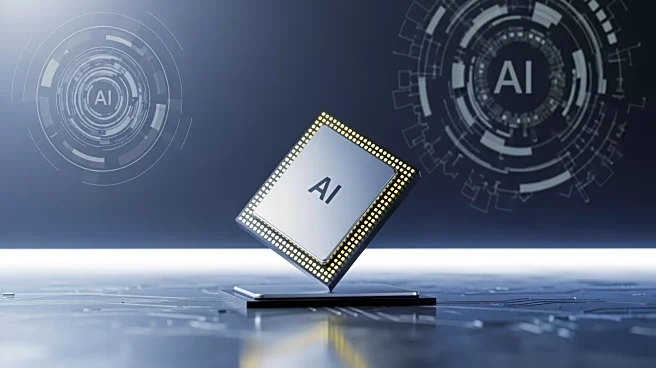What's Happening?
Stacy Rasgon, a top analyst at Bernstein, has issued a cautious outlook on semiconductor giants Intel and Advanced Micro Devices (AMD) as they prepare for upcoming earnings reports. Rasgon maintains a Market-Perform rating on both companies, with price
targets set at $21 for Intel and $200 for AMD. Despite improvements in PC and server markets, Rasgon highlights ongoing challenges for both firms. Intel's recent financial maneuvers, including raising $16 billion through deals with SoftBank, NVIDIA, and the U.S. government, have strengthened its balance sheet but at the cost of share dilution and increased reliance on one-time deals. Meanwhile, AMD's partnership with OpenAI has fueled optimism, driving its stock up by 34% since last quarter. However, Rasgon warns that expectations for AMD's future profitability may be overly optimistic.
Why It's Important?
The cautious stance from Bernstein's analyst reflects broader uncertainties in the semiconductor industry, particularly as companies navigate the evolving AI landscape. Intel's strategic moves to bolster its financial position highlight the pressures faced by traditional chipmakers in maintaining market share amid rapid technological advancements. AMD's partnership with OpenAI underscores the growing importance of AI in driving business growth, yet also raises questions about the sustainability of such partnerships. The analyst's insights suggest that while there is potential for growth, both companies must address fundamental challenges to capitalize on AI opportunities effectively. Investors and stakeholders in the semiconductor sector should consider these dynamics as they assess future prospects.
What's Next?
Intel and AMD are expected to release their earnings reports soon, which will provide further insights into their financial health and strategic direction. Stakeholders will be closely monitoring how Intel addresses its core issues, including market share losses and manufacturing strategy. For AMD, the focus will be on how its partnership with OpenAI translates into tangible business outcomes and whether it can meet heightened investor expectations. The semiconductor industry will likely continue to experience volatility as companies adapt to AI-driven market changes.
Beyond the Headlines
The developments in Intel and AMD's strategies reflect broader shifts in the semiconductor industry, where AI is becoming a critical driver of innovation and competition. Ethical considerations around AI partnerships, such as equity sacrifices and strategic alignments, may influence future business models. Additionally, the reliance on government deals and partnerships highlights the intersection of technology and public policy, potentially affecting regulatory landscapes.



















